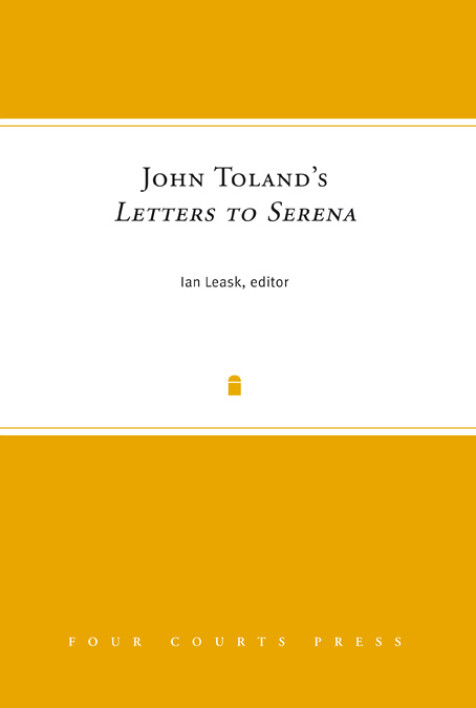John Toland's 'Letters to Serena'
Ian Leask editor
‘Ian Leask’s new edition of John Toland’s Letters to Serena, last published in 1704, has all the marks of a fine new edition of an early-eighteenth century book – it has an index, timeline, all of Toland’s notes, along with editor’s notes explaining many of the obscure names to be found in the letters; and it has a first-rate introduction in which Leask nicely explains the letters and what he takes Toland to be doing … The story that Leask weaves around the Letters to Serena is really quite fascinating’, William Uzgalis, Journal of the History of Philosophy (July 2016).
‘Toland’s fascinating, idiosyncratic Letters to Serena is exactly the sort of work that deserves much more discussion in frequently tepid analyses of ‘insiders and outsiders in early modern philosophy’. This edition helpfully provides the original pagination and annotations, together with Leask’s long introduction’, Charles T. Wolfe, Journal of Early Modern Studies (Fall 2014).
‘Apart from two facsimile versions … there has been no modern English language printing of the Letters since 1704. Ian Leask remedies this undeserved neglect with the edition under review, which is particularly welcome for underscoring the philosophical content of the letters. And he is surely right in choosing to approach them as an "intervention" in philosophical debates, rather than a definitive and systematic statement of position. His introduction contextualizes the book in relation to the prominent contemporaries with whom Toland engaged: Leibniz, Spinoza and Newton. Given the recent resurgence of interest in Spinoza and the debates about the character of the radical enlightenment sparked by Jonathan Israel, publication of the text is timely. Ian Leask sensibly refrains from taking a merely topical slant in this regard. The critical apparatus supplied for the text is informative in due measure, providing the appropriate classical references (chiefly to Cicero) and teasing out the allusions to other philosophers’, Prof. Sarah Hutton, International Journal of Philosophical Studies (April 2015).
‘This edition of John Toland’s Letters to Serena brings into more general circulation a brief but very significant early Enlightenment text … Leask’s introduction presents Toland’s letters as one side of “a radical conversation” in the “broad Republic of Letters”, a conversation very much in line with the Enlightenment project of self-legislation, rather than willingness to be “led like a beast by authority or passion”. Leask summarizes Toland’s career from the time that he claimed in Christianity not mysterious (1695) that revelation was “merely a ‘means of information’”, thus outraging many and leading others to distance themselves’, SEL: Studies in English Literature (Summer 2014).
‘Toland is representative of Ireland’s encounter with the Enlightenment, and as such is a key figure in the development of deistic attitudes which Catholic philosophers of the period opposed. He is interesting because of his untypicality, which make him of interest to every student of Irish culture … Editor Ian Leask provides not only an exemplary edition [of Letters to Serena] but a very full introduction both to Toland’s thought and to the contemporary situation in which he found himself', Peter Costello, Irish Catholic (February 2014).
'Ian Leask has provided us with a fine edition of one of the most characteristically 'Enlightenment' of all so-called 'Enlightenment' figures, one who more eloquently defended individual reason in opposition to received authority than almost anyone of his generation... Part of the pleasure of reading Toland involves the peculiar swagger with which he casually enjoys his own personal triumph over vulgar prejudice, a pleasure he is happy to share with his addressee/correspondent as well as his implied reader. This volume therefore stands as an impressive memorial to a critical intellectual epoch, the time of the political and physical 'ungodding' of the universe', Conrad Brunström, Eighteenth-Century Ireland, Vol. 29 (2014).

